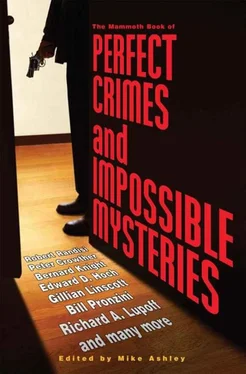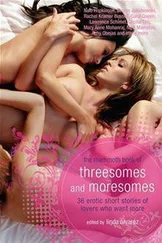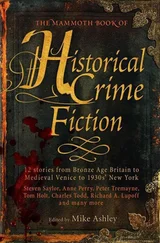He turned back to us. “I’m sorry,” he said, “but there is some trouble at the penthouse. Or else my electrician has lost his mind. He says there is a horrible kind of music being played there and that he can get no response to his ringing at the door. I shall have to go up and see what it is all about.”
The statement was a peculiar one and Tarrant’s eyes, I thought, held an immediate gleam of curiosity. He got out of his seat in a leisurely fashion, however and declared: “You know, Gleeb, I’d like a breath of fresh air after breakfast. Mind if we come up with you? There’s a terrace, I believe, where we can take a step or so while you’re untangling the matter.”
“Not at all, Mr Tarrant. Come right along. I hardly imagine it’s of any importance, but I can guarantee plenty of air.”
There was, in fact a considerable wind blowing across the open terrace that, guarded by a three-foot parapet, surrounded the penthouse on all sides except the north, where its wall was flush with that of the building. The penthouse itself was rather small, containing as I later found, besides the studio which comprised its whole northern end, only a sleeping room with a kitchenette and a lavatory off its east and west sides respectively. The entrance was on the west side of the studio and here stood the electrician who had come to the roof to repair the radio antenna of the apartment house and had been arrested by the strange sounds from within. As we strolled about the terrace, we observed the penthouse itself as well as the wide view below. Its southern portion possessed the usual windows but the studio part had only blank brick walls; a skylight was just visible above it and there was, indeed, a very large window, covering most of the northern wall, but this, of course, was invisible and inaccessible from the terrace.
Presently the manager beckoned us over to the entrance door and, motioning us to be silent, asked: “What do you make of that, Mr Tarrant?”
In the silence the sound of doleful music was more than audible. It appeared to emanate from within the studio; slow, sad and mournful, it was obviously a dirge and its full-throated quality suggested that it was being rendered by a large orchestra. After a few moments’ listening Tarrant said: “That is the rendition of a requiem mass and very competently done, too. Unless I’m mistaken, it is the requiem of Palestrina… There; there’s the end of it… Now it’s beginning again.”
“Sure, it goes on like that all the time,” contributed Wicks, the electrician. “There must be someone in there, but I can’t get no answer.” He banged on the door with his fist, but obviously without hope of response.
“Have you looked in at the windows?”
“Sure.”
We, too, stepped to the available windows and peered in, but beyond a bedroom that had not been used, nothing was visible. The door from the bedroom to the studio was closed. The windows were all locked.
“I suggest,” said Tarrant, “that we break in.”
The manager hesitated. “I don’t know. After all, he has a right to play any music he likes, and if he doesn’t want to answer the door-”
“Who has the penthouse, anyhow?”
“A man named Michael Salti. An eccentric fellow, like many of these artists. I don’t know much about him, to tell the truth; we can’t insist on as many references as we used to, nowadays. He paid a year’s rent in advance and he hasn’t bothered anyone in the building, that’s about all I can tell you.”
“Well,” Tarrant considered, “this performance is a little peculiar. How does he know we may not be trying to deliver an important message? How about his phone?”
“Tried it,” Wicks answered. “The operator says there isn’t any answer.”
“I’m in favour of taking a peek. Look here, Gleeb, if you don’t want to take the responsibility of breaking in, let us procure a ladder and have a look through the skylight. Ten to one that will pass unobserved; and if everything seems all right we can simply sneak away.”
To this proposal the manager consented, although it seemed to me that he did so most reluctantly. Possibly the eerie sounds that continued to issue through the closed door finally swayed him, for their quality, though difficult to convey, was certainly upsetting. In any event the ladder was brought and Tarrant himself mounted it, once it had been set in place. I saw him looking through the skylight, then leaning closer, peering intently through hands cupped about his eyes. Presently he straightened and came down the ladder in some haste.
His face, when he stood beside us, was strained.
“I think you should call the police,” he grated. “At once. And wait till they get here before you go in.”
“The police? But – what is it?”
“It’s not pleasant,” Tarrant said slowly. “I think it’s murder.”
Nor would he say anything further until the police, in the person of a traffic patrolman from Park Avenue, arrived. Then we all went in together, Gleeb’s passkey having failed and the door being broken open.
The studio was a large, square room, and high, and the light, sweeping in through the north wall and the skylight, illuminated it almost garishly. It was sparsely furnished; a couch, a chair, a stool, an easel and a cabinet for paints and supplies stood on a hardwood floor which two rugs scarcely covered. The question of the music was soon settled; in one corner was an electric victrola with an automatic arrangement for turning the record and starting it off again when it had reached its end. The record was of Palestrina’s Requiem Mass, played by a well-known orchestra. Someone, I think it was Tarrant, crossed the room and turned it off, while we stood huddled near the door, gazing stupidly at the twisted, bloody figure on the couch.
It was that of a girl, altogether naked; although she was young – not older than twenty-two certainly – her body was precociously voluptuous. One of her legs was contorted into a bent position, her mouth was awry, her right hand held a portion of the couch covering in an agonised clutch. Just beneath her left breast the hilt of a knife protruded shockingly. The bleeding had been copious.
It was Tarrant again who extinguished the four tall candles, set on the floor and burning at the corners of the couch. As he did so he murmured:
“You will remember that the candles were burning at eight forty-seven, officer. I dislike mockery.”
Then I was out on the terrace again, leaning heavily against the western parapet. In the far distance the Orange mountains stood against the bright horizon; somewhat nearer, across the river, huddled the building masses that marked Newark; overhead a plane droned south-westward. I gagged and forced my thoughts determinedly toward that plane. It was a transport plane, it was going to Newark Airport; probably it was an early plane from Boston. On it were people; prosaic people, thank God. One of them was perhaps a button salesman; presently he would enter the offices of Messrs. Simon and Morgetz and display his buttons on a card for the benefit of Mr Simon… Now my insides were behaving less drastically, I could gasp; and I did gasp, deep intakes of clear, cold air.
When I came back into the studio, a merciful blanket covered the girl’s body. And for the first time I noticed the easel. It stood in the south-east corner of the room, diagonally opposite the couch and across the studio from the entrance doorway. It should have faced north-west, to receive the light from the big north window, and in fact the stool to its right indicated that position. But the easel had been partly turned, so that it faced south-west, toward the bedroom door; and one must walk almost to that door to observe its canvas.
This, stretched tightly on its frame, bore a painting in oil of the murdered girl. She was portrayed in a nude, half-crouching pose, her arms extended, and her features held a revoltingly lascivious leer. The portrait was entitled “La Seduction”. In the identical place where the knife had pierced her actual body, a large nail had been driven through the web of the canvas. It was half-way through, the head protruding two inches on the obverse side of the picture; and a red gush of blood had been painted down the torso from the point where the nail entered.
Читать дальше











